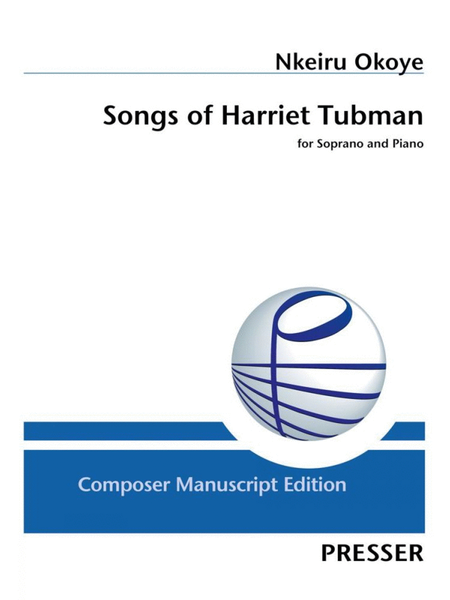Songs of Harriet Tubman
-
Ships in 2 to 3 weeks
Details
Description
SKU: PR.411411690
Composed by Nkeiru Okoye. 32 pages. Duration 25 minutes. Theodore Presser Company #411-41169. Published by Theodore Presser Company (PR.411411690).UPC: 680160686032.
The four "name" arias in HARRIET TUBMAN: When I crossed that Line To Freedom, portray stages in the title character's transformation from slave to freedom-fighter. First, as a child, she introduces herself as "Araminta," who is often called, "Minty." Her naive prattlings establish a dramatic contrast between childhood's contentment and the harsh realities of slave existence. "My name is Harriet, now. Don't call me Minty any more," declares the teenaged heroine. Having survived a series of abusive masters and a debilitating injury, she asserts her rites of womanhood through the shedding of her childhood moniker. The grown Harriet Tubman reintroduces herself as a free woman, recounting the harrowing tale of escape from slavery. Confronted by bittersweet poignancy at having crossed the line to freedom without family to welcome her, she is inspired towards a new goal: returning home to rescue loved ones. In the final aria, Tubman, a seasoned conductor on the Underground Railroad, embraces the folkloric title given to her by escapees and aspiring runaways. "I am 'Moses, the Liberator,'" she proclaims. Her transformation is complete.
The four “name” arias in HARRIET TUBMAN: When I crossed thatLine To Freedom, portray stages in the title character's transformationfrom slave to freedom-fighter.First, as a child, she introduces herself as “Araminta,” who is oftencalled, “Minty.” Her naïve prattlings establish a dramatic contrastbetween childhood's contentment and the harsh realities of slaveexistence.“My name is Harriet, now. Don't call me Minty any more,” declares theteenaged heroine. Having survived a series of abusive masters and adebilitating injury, she asserts her rites of womanhood through theshedding of her childhood moniker.The grown Harriet Tubman reintroduces herself as a free woman,recounting the harrowing tale of escape from slavery. Confronted bybittersweet poignancy at having crossed the line to freedom withoutfamily to welcome her, she is inspired towards a new goal: returninghome to rescue loved ones.In the final aria, Tubman, a seasoned conductor on the UndergroundRailroad, embraces the folkloric title given to her by escapees andaspiring runaways. “I am 'Moses, the Liberator,'” she proclaims. Hertransformation is complete.

 Share
Share